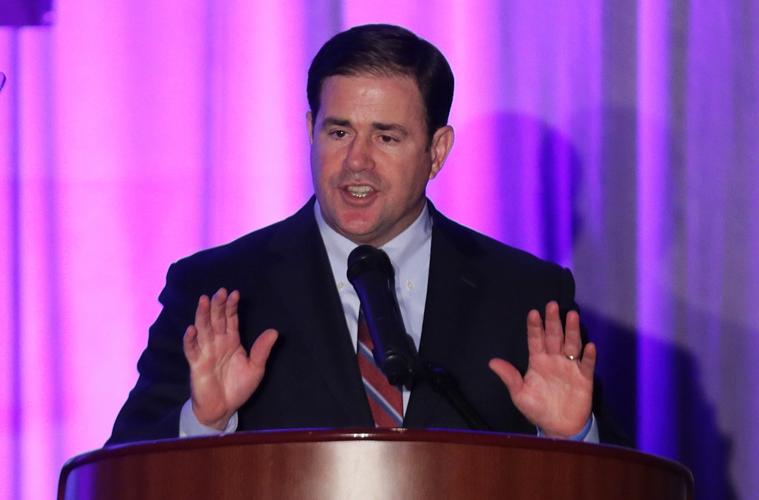PHOENIX — A bid to allow some gun owners to bring their guns into public buildings has suffered a setback, perhaps a fatal one.
It was one of many issues waiting to be voted on as legislators dealt with the state budget, which was passed early Wednesday.
Here are some of the bills voted on Wednesday:
Gun legislation defeated
On a tie vote, the Senate defeated legislation that would have allowed those who have a state-issued permit to carry a concealed weapon to ignore the “no guns” signs on many government buildings.
The defeat came even after Sen. Debbie Lesko, R-Peoria, said the signs are useless and that criminals already ignore them.
But backers of the measure, led by the Arizona Citizens Defense League, were making a last-minute push to convince at least two foes to change their minds to provide the required 16 votes to send the measure to the governor.
Current law allows the operators of government buildings to declare their facilities to be gun-free zones by posting signs at entrances and providing lockers so those who are armed can store their guns.
SB 1257 would overrule that, saying that government agencies would have to buy and install metal detectors and have security guards at all public entrances. More to the point, the failure to do that would mean that those who have concealed-carry permits could ignore the signs.
Two water measures passed
Gov. Doug Ducey is going to have to decide whether he wants to dilute provisions of state water laws.
On a 16-12 vote the Senate gave final approval to SB 1400, which requires counties that have their own water-requirements for developers to review them every five years. But it would take a unanimous vote of the Board of Supervisors to rescind the ordinance.
The potentially more far-reaching measure, SB 1268, would allow any city within either Cochise or Yuma counties to unilaterally exempt itself from the requirements. It was approved on a 17-12 vote.
Both measures now await action by Ducey who has said in speeches that ensuring Arizona has adequate water is important.
The fight has its roots in the historic 1980 Groundwater Code.
It led to the establishment of five “active management areas” around the state in the Phoenix, Pinal, Prescott, Tucson and Santa Cruz areas that have regulations designed to reduce groundwater pumping. A key tool is a requirement to show a 100-year “assured water supply.”
An amendment to that law allows counties to have similar mandates, with Cochise and Yuma having opted in.
Castle & Cooke, which hopes to put in a 7,000-home development in Sierra Vista, got such certification of assured water supply from the state Department of Water Resources. But a trial judge ruled that DWR acted improperly and did not consider the competing claims to the water, notably from the Bureau of Land Management, which is concerned about the water supply for the San Pedro River.
The Court of Appeals is considering the ruling.
But it will not matter what that court decides if SB 1268 becomes law, as it would permit the Sierra Vista council to simply declare that development within its borders is not subject to the assured water supply requirement.
Sen. Gail Griffin, R-Hereford, the sponsor of both measures, read letters detailing all the city and county have done to conserve water. And SB 1268 lists specific conditions a city would have to meet to exempt itself from the county ordinance, ranging from having a plan for reuse of reclaimed water to requiring low-water use plants in public rights of way.
Pet store bill moves to governor
Local communities will lose the right to ban the sale of commercially bred animals under the terms of legislation sent Wednesday to Gov. Doug Ducey.
SB 1248 is specifically designed to overrule existing ordinances in Phoenix and Tempe that allow pet shops to sell only rescue and shelter animals. It also would short circuit similar regulations being considered in Tucson and elsewhere.
But proponents said it’s a good deal because it requires pet stores to ensure their suppliers abide by U.S. Department of Agriculture regulations for the breeding of dogs and cats. And that, they argued, helps ensure animals are not being mistreated.
That contention drew derision from Sen. Steve Farley, D-Tucson.
“The USDA regulations allows (a) dog’s mother to be kept in a wire cage that is six inches longer than her body and six inches taller than her body, and they can be stacked three or four high on top of each other,” Farley told Senate colleagues.
Sentencing bill for illegal migrants fails
House lawmakers refused to make probation and other sentencing alternatives off limits to people in the country illegally who commit crimes.
Current law already allows judges to consider various factors in determining how long a sentence to impose. One of those is the immigration status of the offender.
SB 1377 sought to spell out if that is the case, a judge must impose at least the “presumptive” sentence for the crime. That would deny the person any chance to argue there are reasons for the court to be more lenient.
It also would have meant no option for a sentence of probation or other alternative.









